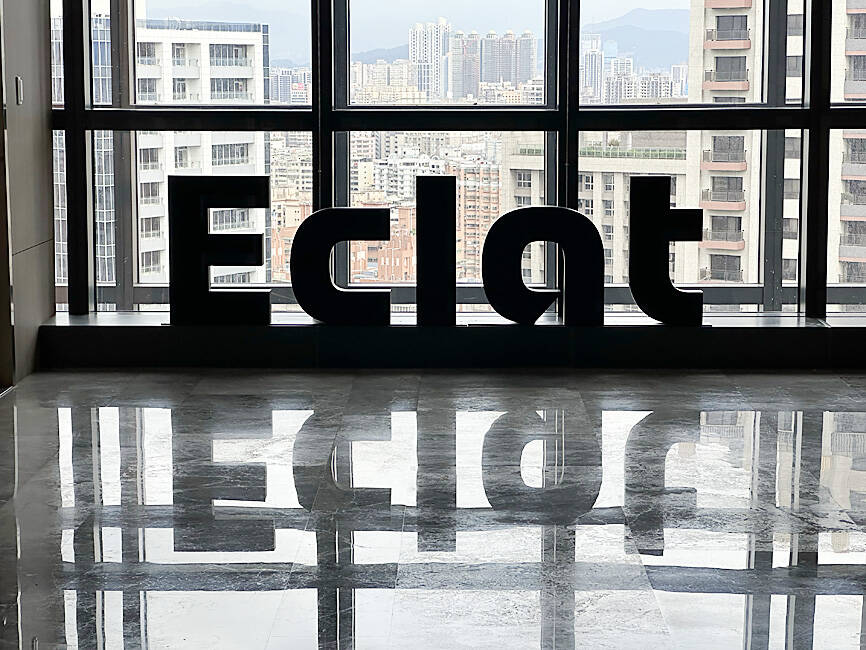Eclat Textile Co (儒鴻) is optimistic about its business outlook this year as it has clear order visibility for the next six months, the garment and fabric supplier said yesterday.
The company said its orders are mostly confirmed for the first half of this year and it has begun to receive new orders for the third quarter.
In addition, the company has seen stronger order growth from mid-sized and high-priced brand clients, it said, adding that the addition of six new customers last year would help contribute about 15 percent to its revenue this year.

Photo: Fang Wei-chieh, Taipei Times
Eclat, which counts global brands such as Nike Inc, Gap Inc, Target Corp, Lululemon Athletica Inc and Under Armour Inc among its top customers, has fabric operations in Taiwan and Vietnam, as well as garment plants in Vietnam, Cambodia, Lesotho, China and Indonesia.
The company said its garment plants have all been running at full capacity, with its outsourced capacity contribution estimated to rise to 30 percent this quarter, from 25 percent last quarter, indicating solid order recovery.
Eclat’s net profit in the fourth quarter last year was NT$1.39 billion (US$44.1 million), up 76.69 percent annually, or earnings per share of NT$5.1.
The increase was buoyed by higher revenue during the October-to-December quarter, which grew 11.3 percent annually to NT$8.49 billion, while gross margin and operating margin improved annually to 32.51 percent and 22.83 percent, respectively, company data showed.
Despite a notable sales recovery and a reversal of declining profit during the final quarter of last year, last year’s overall net profit was still down 23.77 percent annually to NT$5.18 billion and full-year revenue fell 22 percent to NT$30.79 billion due to customers' inventory adjustments.
Earnings per share were NT$18.87 last year, down from NT$24.75 in 2022, but gross margin increased by 3.59 percentage points to 31.44 percent and operating margin rose 1.5 percentage points to 21.28 percent, company data showed.
The increases in margins last year were mainly due to higher factory utilization, better production efficiency, improved product mix and inventories of low-priced raw materials, Eclat vice president for finance and accounting Roger Lo (羅仁傑) said.
Last year, the garment business accounted for 62 percent of the company’s total sales, with the fabric business taking the remaining 38 percent, Eclat vice chairman Richard Wang (王樹文) said.
Looking ahead, Wang said he is not pessimistic about the North American market this year and expects growth momentum to be better than last year, as customers have started to place long-term orders instead of rush orders.
In addition, large brands and channel customers remain active in placing orders, while order momentum from medium-sized brand clients is also quite strong, he said.
The company plans to expand capacity at its Indonesian plants this year and expects new production lines to make a substantial revenue contribution from the second quarter of next year, he added.

‘SWASTICAR’: Tesla CEO Elon Musk’s close association with Donald Trump has prompted opponents to brand him a ‘Nazi’ and resulted in a dramatic drop in sales Demonstrators descended on Tesla Inc dealerships across the US, and in Europe and Canada on Saturday to protest company chief Elon Musk, who has amassed extraordinary power as a top adviser to US President Donald Trump. Waving signs with messages such as “Musk is stealing our money” and “Reclaim our country,” the protests largely took place peacefully following fiery episodes of vandalism on Tesla vehicles, dealerships and other facilities in recent weeks that US officials have denounced as terrorism. Hundreds rallied on Saturday outside the Tesla dealership in Manhattan. Some blasted Musk, the world’s richest man, while others demanded the shuttering of his

ADVERSARIES: The new list includes 11 entities in China and one in Taiwan, which is a local branch of Chinese cloud computing firm Inspur Group The US added dozens of entities to a trade blacklist on Tuesday, the US Department of Commerce said, in part to disrupt Beijing’s artificial intelligence (AI) and advanced computing capabilities. The action affects 80 entities from countries including China, the United Arab Emirates and Iran, with the commerce department citing their “activities contrary to US national security and foreign policy.” Those added to the “entity list” are restricted from obtaining US items and technologies without government authorization. “We will not allow adversaries to exploit American technology to bolster their own militaries and threaten American lives,” US Secretary of Commerce Howard Lutnick said. The entities

Minister of Finance Chuang Tsui-yun (莊翠雲) yesterday told lawmakers that she “would not speculate,” but a “response plan” has been prepared in case Taiwan is targeted by US President Donald Trump’s reciprocal tariffs, which are to be announced on Wednesday next week. The Trump administration, including US Secretary of the Treasury Scott Bessent, has said that much of the proposed reciprocal tariffs would focus on the 15 countries that have the highest trade surpluses with the US. Bessent has referred to those countries as the “dirty 15,” but has not named them. Last year, Taiwan’s US$73.9 billion trade surplus with the US

Prices of gasoline and diesel products at domestic gas stations are to fall NT$0.2 and NT$0.1 per liter respectively this week, even though international crude oil prices rose last week, CPC Corp, Taiwan (台灣中油) and Formosa Petrochemical Corp (台塑石化) said yesterday. International crude oil prices continued rising last week, as the US Energy Information Administration reported a larger-than-expected drop in US commercial crude oil inventories, CPC said in a statement. Based on the company’s floating oil price formula, the cost of crude oil rose 2.38 percent last week from a week earlier, it said. News that US President Donald Trump plans a “secondary